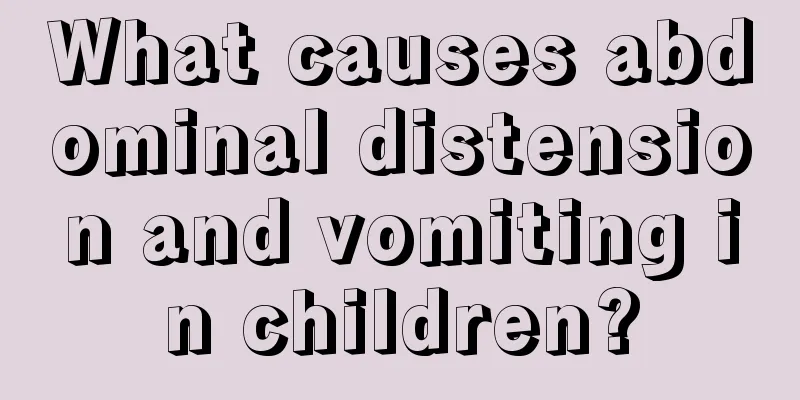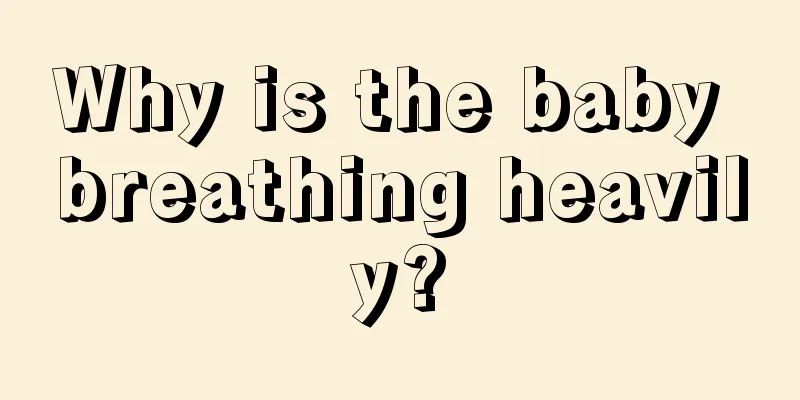What causes abdominal distension and vomiting in children?

|
Friends who have babies at home are worried about children's abdominal distension and vomiting, especially newborn babies. Once vomiting occurs, new parents will be caught off guard. They don’t know what is going on and are worried. Therefore, we must clarify the cause of the child’s vomiting before we can give the child the correct treatment. Let us understand what causes abdominal distension and vomiting in children? Amniotic fluid aspiration: Due to the large amount of amniotic fluid aspiration, it has a certain stimulating effect on the stomach. Newborns often vomit soon after birth, spitting out clear water, mucus or a small amount of bloody fluid, but their general condition is good. For frequent vomiting caused by amniotic fluid aspiration, gastric lavage can be used with 1% soda water. Pyloric spasm: In the neonatal period, due to temporary dysfunction of the pyloric function, projectile vomiting often occurs shortly after feeding. Clinically, large amounts of milk and milk clots are often vomited, and the condition may be better or worse. For pyloric spasm, you can use 1:1000 atropine dripped into the mouth 5-10 minutes before feeding. Start with 1 drop and gradually increase the amount. The maximum amount should not exceed 4 drops until the child's face turns red. Generally, a significant therapeutic effect can be achieved. Neonatal constipation: Newborns generally begin to excrete meconium within 10 hours after birth. If they have very few bowel movements or the time for meconium excretion is significantly prolonged in the first few days after birth, abdominal distension and vomiting may also occur clinically. For newborn constipation, normal saline enema can be used. Once the bowel movement is smooth, abdominal distension and vomiting often ease. Infectious factors: It is the most common cause of vomiting in newborns. In addition to infections in the digestive tract itself such as epidemic diarrhea, hepatitis, etc., infections outside the digestive tract such as otitis media, pneumonia, sepsis, meningitis, etc. are also common causes of vomiting in newborns. It is worth mentioning that gastrointestinal malformations often play a role in the incidence of neonatal vomiting and are extremely harmful, so we should pay special attention to them. Esophageal atresia: Newborns experience severe vomiting soon after birth, vomiting everything they eat, often vomiting foamy liquid like crab vomit. Pyloric hypertrophic stenosis: Clinically, vomiting often occurs around 2 weeks after birth and progressively worsens, often manifested as projectile vomiting, but the baby still feels hungry after vomiting. Due to frequent vomiting, newborns often suffer from dehydration and malnutrition. During abdominal examination, date pit-like lumps can be felt. Intestinal atresia: Persistent vomiting often occurs within 1 day after birth. The symptoms are often relieved after vomiting, but vomiting starts again a few hours after feeding. The vomitus is often accompanied by milk, bile and feces-like liquid. Intestinal malrotation: Intermittent vomiting often occurs within a few days after birth, sometimes mild and sometimes severe, and the vomitus may be milk or bile. Hirschsprung's disease: There is no meconium or persistent constipation after birth, and clinically it is often accompanied by progressive abdominal distension and vomiting. In summary, for vomiting in the neonatal period, it is very important to understand the medical history, delivery history, whether amniotic fluid is aspirated, feeding history, meconium discharge and other associated symptoms. Clinically, attention should be paid to the abdomen of the newborn to observe whether there is a gastric type, intestinal type, abdominal mass, and the anus should be carefully examined. For those who vomit frequently in the early stages, they should fast before a clear diagnosis is made. Once vomiting occurs, they should lie on their side to avoid suffocation and go to the hospital immediately. What causes abdominal distension and vomiting in children? Regarding this issue, through the above description, I think all parents must have understood that when a child has such a condition, we must first find out the cause. We cannot blindly give the child medicine, nor can we ignore it. If the child's vomiting does not improve, he must go to the hospital for relevant examination and treatment in time. |
<<: What to do if your child vomits after eating
>>: Why do children cry at night?
Recommend
How to deal with a child's cough and nosebleed?
Children are our hope for the future, because the...
What to do if your baby coughs?
Because of the body's resistance and the unde...
What medicine should children take for stomach pain and vomiting
Children will vomit after having stomach pain. Th...
What are the dietary arrangements for nine-month-old babies?
When taking care of a nine-month-old baby, you mu...
Introduction to Tonsillitis in Babies
Tonsillitis in babies may be caused by the mother...
Newborn baby's forehead does not twitch
In recent years, the number of children around us...
What to do if your baby has precocious puberty
Since the reform and opening up, our lives have b...
How to treat stomach heat in children
What we often call stomach heat is actually stoma...
What is the reason why my baby has yellow-green watery stool?
Diarrhea is often caused by eating spoiled food o...
What medicine should children take for cold and cough
Children are very prone to catching colds when th...
How to prevent mosquitoes for babies
With the arrival of summer, there are more and mo...
Is it better for children to sleep on a hard bed or a soft bed?
Childhood is an important period of growth and de...
Precautions for suctioning sputum in children
If suctioning is performed on children, some prec...
Children who grow up to be successful have these characteristics
The hardest thing to change in a person's lif...
Why is the baby's hair falling out in a circle?
Children are the treasures of their parents. Any ...









